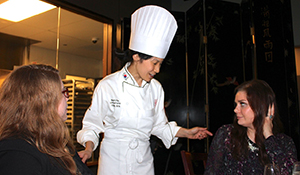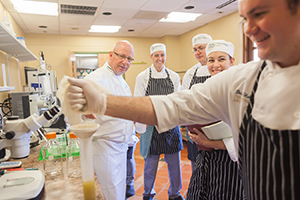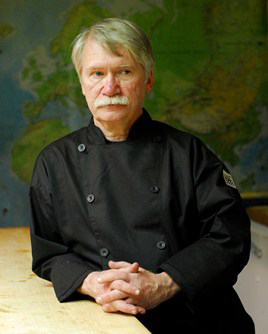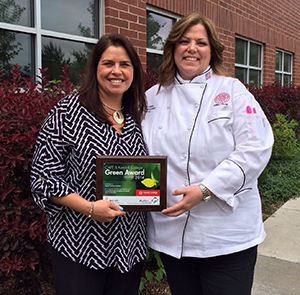Teaching and Implementing the New Interaction Economy, Part II
 “How are you today?”, though arguably better than nothing, is so overused and insincere that it fails to distinguish the service culture of your retail foodservice outlets. To employ an effective interaction strategy (and increase sales), understand that customers respond on conscious and unconscious levels to every aspect of their engagement with your instructors and student employees.
“How are you today?”, though arguably better than nothing, is so overused and insincere that it fails to distinguish the service culture of your retail foodservice outlets. To employ an effective interaction strategy (and increase sales), understand that customers respond on conscious and unconscious levels to every aspect of their engagement with your instructors and student employees.
By Renee Zonka, RD, CEC, CHE, MBA
Last month, I wrote about how an “interaction economy” is replacing the “experience economy” with which the United States has identified since 1999 upon the publication of The Experience Economy: Work Is Theatre & Every Business a Stage by B. Joseph Pine, II, and James H. Gilmore. As I stated, everyone can identify with the basic premise of an experience economy, in which companies state an “experience” when they engage customers in a memorable way.

 In the candy and chips aisles, Sriracha is undoubtedly the pepper of the year, as evidenced at the Sweets & Snacks Expo in May. And “free from” claims reign supreme in this industry. A foremost food-trends expert surveys the landscape of cross-over flavor demands between the snack shop and restaurant.
In the candy and chips aisles, Sriracha is undoubtedly the pepper of the year, as evidenced at the Sweets & Snacks Expo in May. And “free from” claims reign supreme in this industry. A foremost food-trends expert surveys the landscape of cross-over flavor demands between the snack shop and restaurant. Since graduating in May, alums have already earned esteemed jobs, including at the “world’s best restaurant,” located in Denmark, and the world’s largest privately owned flavor and fragrance developer in Switzerland.
Since graduating in May, alums have already earned esteemed jobs, including at the “world’s best restaurant,” located in Denmark, and the world’s largest privately owned flavor and fragrance developer in Switzerland. While beginning a professional journal can be rewarding on several levels, maintaining a journal requires commitment. Here, Dr. Mayo offers tips and ideas for making the process of recording more valuable over time, as well as less taxing.
While beginning a professional journal can be rewarding on several levels, maintaining a journal requires commitment. Here, Dr. Mayo offers tips and ideas for making the process of recording more valuable over time, as well as less taxing. Chef Weiner lists his first 50 articles written for CAFÉ’s “The Gold Medal Classroom,” for the benefit of readers.
Chef Weiner lists his first 50 articles written for CAFÉ’s “The Gold Medal Classroom,” for the benefit of readers. In curriculum development, although enrollment-management departments like to promote courses that concentrate on attractive ancillary skill sets, insufficient dedication to teaching strong foundational abilities will negatively impact student employability and success.
In curriculum development, although enrollment-management departments like to promote courses that concentrate on attractive ancillary skill sets, insufficient dedication to teaching strong foundational abilities will negatively impact student employability and success. A collegiate culinary-arts program in South Florida earns top honors for exemplary practices in—and innovative teaching of—ecological sustainability.
A collegiate culinary-arts program in South Florida earns top honors for exemplary practices in—and innovative teaching of—ecological sustainability. The Culinary Institute of America introduces an online learning experience focusing on the “blendability” of mushrooms at
The Culinary Institute of America introduces an online learning experience focusing on the “blendability” of mushrooms at